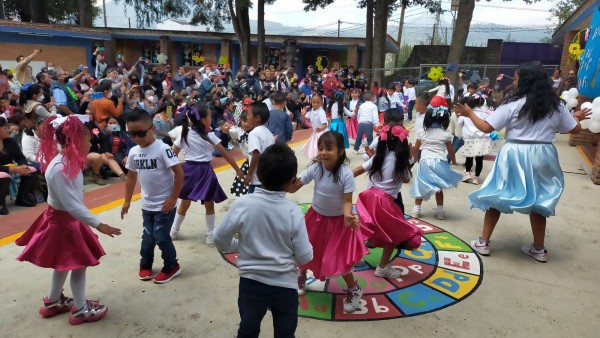
The San José Community Center for Child Development offers comprehensive care to preschool children in “Jardines de San Juan Ajusco”, Mexico City, a neighborhood affected by social marginalization, poverty and general lack of resources and opportunities.
For our program of activities during the month of June, we included the theme of "The Family" to work with children, since previously, in the month of April, we celebrated Children's Day, in May Mother's Day and in June we celebrated father’s day: this is how we were able to unite these celebrations in a joint party.
In the classrooms we work with the children on the theme of the family throughout the month through different activities such as drawings and stories about the family: who makes up a family—dad, mom, siblings, grandparents, uncles, cousins, etc., and create the awareness about the fundamental role of families for them from early childhood.
They also made crafts, which the children gave to their parents as a gift.
From such an early age, children are very clear about what family is, they identify with their relatives as people who love them, care for them, understand them and care about them.
On June 17, we celebrated Family Day at the San José center, and we had a get-together with the children accompanied by their family members. The educators prepared dances in groups with the children who presented for their families. This event was the first that we were able to hold with everyone since the start of the pandemic more than two years ago, and all the relatives who participated left very happy to have enjoyed and followed the children’s dance.
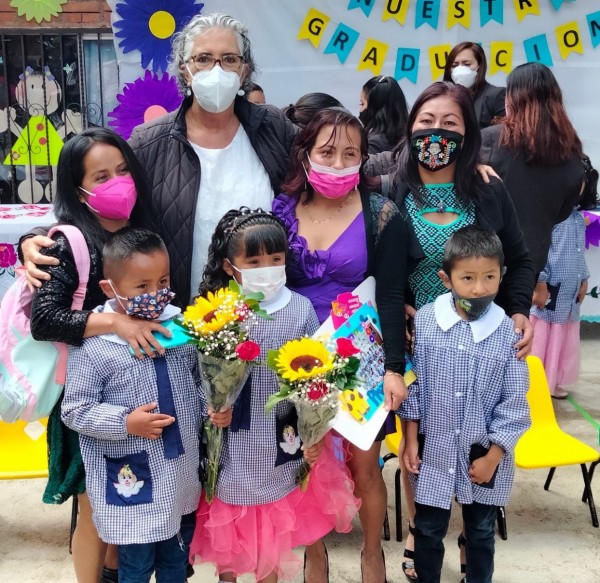
Education is essential to move towards more just societies and fight poverty, especially in developing countries. However, when education is interrupted, children who depend on school programs to also access some basic services, such as food and nutrition, are exposed to greater vulnerability because, during the time they do not go to school they stop receiving those services.
The San José Community Child Development Center from the CSP in Mexico committed itself from the beginning of the pandemic to guarantee that educational and food programs were not affected by the contingency, and, despite the difficulties, on July 9 the center was able to celebrate the graduation of 32 boys and girls from Preschool Three, who will begin a new stage in primary school next school year, after the summer.
Since the start of the pandemic, in mid-March 2020, all schools in Mexico have been closed, and education is being taught remotely. All children and adolescents carry out their homework and school activities from home. The main challenge is the enormous social-educational inequalities, with many families in a state of vulnerability such that they have not been able to access new ways of imparting education with the help of technology.
During the 2020-2021 school year we were working together from the San José Center with the parents to guarantee the proper development of the children cared for in the center: presential educational activities and community dining service were maintained by organizing the children in groups, never exceeding 30% of the capacity of the center, and observing the sanitary protection measures.
This school year that has now ended was marked by many changes, as we were working with fewer children a day and complementing it with distance learning activities. Two months before the end of the year, the epidemiological traffic light of the Covid-19 pandemic allowed us to work with all Preschool Three children and support them in their weak areas to prepare them for their new stage of training.
We celebrated this achievement with a Eucharist and a small graduation ceremony for the 32 boys and girls from Preschool 3, accompanied by a family member and the center team. A positive aspect in this situation has been the collaboration of the parents, who have been more attentive than in the past. They understood the gravity of the moment and that their cooperation was essential for the benefit of the children.
One month before the start of the new 2021-2022 school year, the country continues to register new infections, as well as an increase in the rebound due to the third wave of Covid-19. The educational authorities have finally announced the return to face-to-face classes, which has created divided opinions among parents.
The challenge of the San José Center for the next school year will also be to be able to maintain the good mental health of the little ones, who need to interact with each other, and continue to guarantee the continuity of their learning in the challenging context of the pandemic.
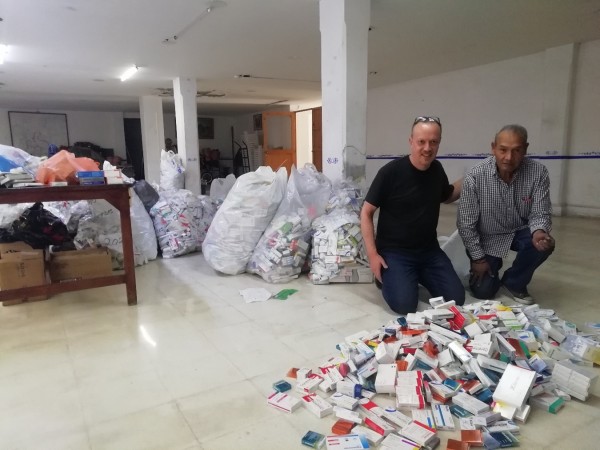
The challenges we must face in the midst of this pandemic, we know well, are many and complex, and vary greatly between countries and social classes. Christian communities, families, parishes, or associations, we also know, are called to carry out prophetic actions that denounce the injustices of our societies, while announcing the paths of solidarity and generosity.
In the parish community of El Rosario, in Mexico City, before the pandemic began, we had already started a drug bank project, with the aim of offering medicines to people in vulnerable situations, promoting donations from the community, and also to channel expired medicines to an institution that destroys them under environmental control and thus remove them from homes, avoiding accidents and that the medicines could end up in the garbage, with the consequent risk and contamination.
The pandemic aggravated the shortage of medicines among the population: massive formal unemployment caused entire families to lose their Social Security affiliation, which here means losing free access to pharmaceutical products. Millions of chronically ill people who depend on drugs to maintain their health were suddenly faced with the need to buy them, at prices that were often unaffordable. Together with them, the people without formal employment affiliated to the free clinics saw how the aid with medicines disappeared as a result of a serious crisis of shortages of medicines caused by the political context.
In the parish office we have witnessed the growing number of people who have approached us in these months with their prescriptions looking for all kinds of medicines, especially to treat chronic conditions, which often mean the cruel and impossible dilemma between investing the scarce economic resources available in medicines or in food, payment of the rent, or other basic needs. Thus we have seen diabetic patients who have been without insulin for weeks, epileptics with repeated seizures since they stopped taking medication, and a long list of complex situations.
As demand increased, we were also able to expand the network of individuals and parishes who pledged to promote drug donations from those who no longer use them. And so, discreetly and anonymously, bag after bag, the medicine bank has been nurturing itself to be able to fill an average of 400 prescriptions per month, 5,000 since the pandemic began!
Solidarity initiatives are successful when they are supported by the generosity of people, who respond to the real needs of the community. Our small bank of medicines is a witness to the fact that, box after box, even medicines can multiply in the midst of a pandemic.
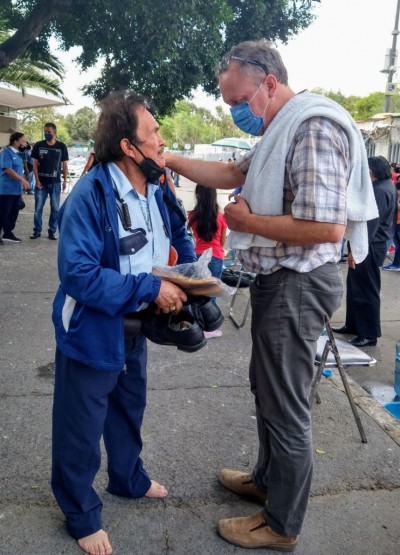
Reviewing experiences of different members of the Community of Saint Paul this past Holy Week, we reproduce here this testimony that Pablo Cirujeda sends from Mexico City.
In the context of the Holy Week celebrations that we organize in the Rectoría del Rosario, in Mexico City, with the support of three other parishes of the deanery, we had the idea of organizing a different footwashing this past Holy Thursday.
For a year we have been cooking and delivering food to the unemployed and homeless population that congregates around the bus terminal and Metro Observatorio stop, right on the parish boundary. This activity takes place every Tuesday and Thursday, and currently we have already been able to share more than 15,000 hot meals.
We planned to carry out a foot washing for Holy Thursday after the delivery of food to all the people who would like to receive this risky and humble gesture of Jesus. After a year walking with this marginal population, there are countless stories and encounters that our pastoral team has treasured with them: stories of violence, marginalization, hope, addictions, struggle, migration...
However, on a daily basis we witness the scarcity in which these people find themselves, and that on many occasions they have asked us for support with clothes, shoes or medicines. How to wash their feet and see that those same feet return to some torn and worn shoes? So, during the Lenten season we collected new or used shoes in good condition among many volunteers and donors, and also socks to complete each pair.
Then, on Holy Thursday, after the delivery of the usual 250 meals at noon, we invited those who had received the meal to have their feet washed by one of the four priests present, or by some volunteers from this community project. One by one they went through this simple ritual, after which we were able to give them a new pair of shoes and new socks.
Thanks to the support of a large group of volunteers from the four parishes that we collaborate with in this project, including a youth choir, the ceremony was carried out with order and great emotion on the part of the people who were presented with their new shoes.
This Holy Thursday, despite the needs generated by the pandemic, we were able to share a little solidarity with some of those most affected by the lack of employment and a decent home.
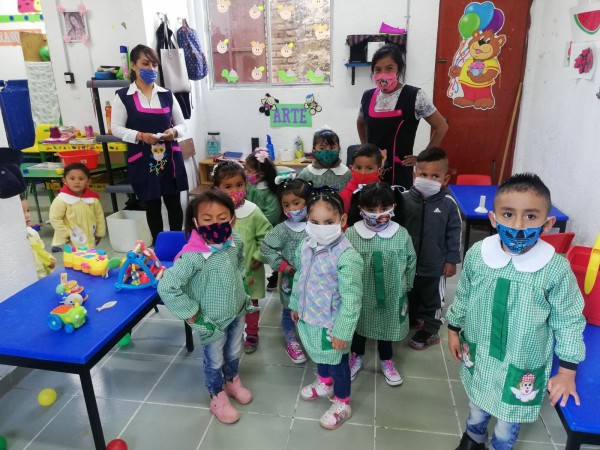
The coronavirus pandemic has affected all dimensions of daily life for millions of people around the world. The social and financial consequences are more noticeable every day. From the San José center in Ajusco (Mexico City) we have been working with the community during the months of confinement with a nutritional support program and distance educational activities for girls and boys of preschool ages, with their challenges and problems , since not all families have the means for digital and remote monitoring. The center was working in this way from the beginning of the confinement due to the pandemic, in mid-March, until the end of the school year at the end of June 2020.
For the start of the new academic year 2020-2021, the San José center team, together with the parents, considered the need to reopen the center to continue offering its services to the 115 girls and boys enrolled. The idea was to work with them with educational activities and to resume the nutritional services using the center at a quota of 40% of its capacity, while observing all the sanitary safety measures. To organize how to function in this new modality we had meetings with the parents, and receiving all their support, finally, on August 31, we reopened the doors of the center for the start of the new school year.
It was a very different beginning, compared with previous years. We are used to handling more than 100 children on a daily basis, and now receiving only a third of them makes the operation more agile: the center facilities feel calmer, with an unusual order in the classrooms, compared to working with the whole group. In the same way, we noticed that most of the children feel more welcome with a small group, they receive more attention from the teacher and they feel more sheltered. The other point to highlight is that there are almost no absences, except for illness or some matter that prevents it, since parents do not want to miss the only days that their children now have to attend the center. They are very excited and grateful to the center for this initiative and they all hope that the bad times we are experiencing due to the pandemic will soon pass and that we can return to normality.
For this new way of working, one of the preventive measures for health is the mandatory use of masks, which is a very big challenge for such young children: they lose them, bite them or forget about their use, although we try to use them correctly all the time.
The teachers are happy with this initiative, although they have to make an extra effort to achieve optimal learning results with the children. Apart from the activities they carry out with the children in the center, they continue to work remotely with the parents, sending homework, solving questions and having consultancy appointments with them when necessary.
The children of the San José center are very happy to be able to return after several months, although they do not understand very well why they are attending in small numbers, and some ask their teachers why can they just come every day. Even in these exceptional circumstances, at the San José center they receive comprehensive care, and that is what, in the end, really matters.
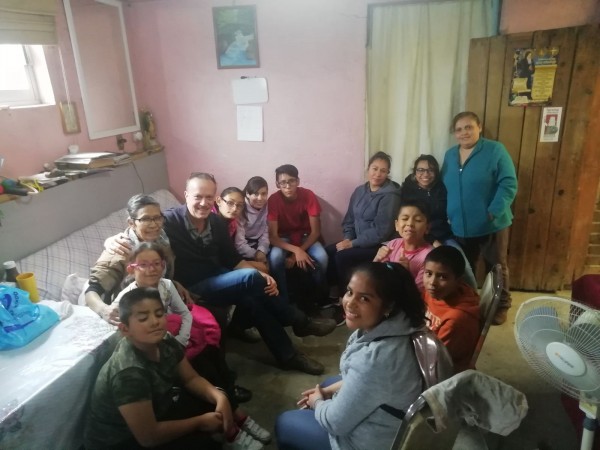
On the occasion of the Extraordinary Mission Month convened by Pope Francis for October 2019, the Archdiocese of Mexico proposed that all parishes join in this initiative through a “megamission” to meet the people most in need of joy and hope in this great city.
In the Rectory of Our Lady of the Rosary, directed by Pablo Cirujeda, of the Community of Saint Paul, all parish groups participated with a weekend dedicated to the sick and the elderly confined to their homes by their chronic conditions. As many as seventy children of the children’s catechesis program, their catechists and parents, as well as other pastoral agents—members of the liturgy team, family ministries and other parishioners—set out to walk the streets of the neighborhoods that are form the parish territory, visiting about forty people who received, with some surprise, the fact that the parish community was approaching their particular situation to listen and accompany them, and in some cases assist in their needs, such as cleaning the house or getting warm clothes.
As a result of this initiative we will assume the commitment to continue visiting those people who have requested it, to offer them company, bring them communion, and give them the opportunity to continue being part of the parish despite the limitations imposed by their diseases .
We all enjoyed this weekend of parish mission, but especially the youngest along with the oldest, discovering a way to be together despite their differences and the distance between generations.
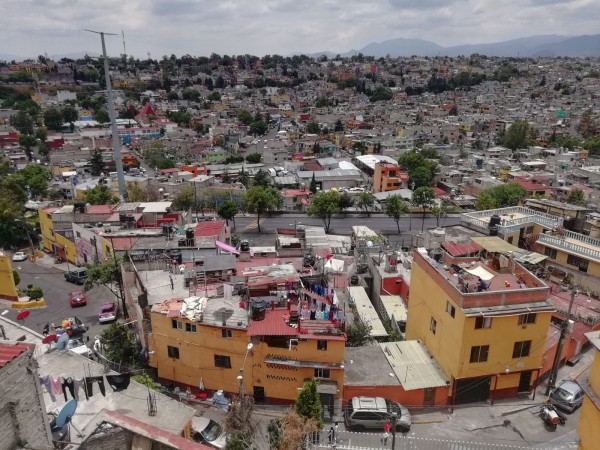
The CSP is present in Mexico City through two different pastoral projects: on the one hand, in the south of the city we coordinate the Community Center for Child Development “San José”, in which 122 children under 6 years of age receive comprehensive attention every day in the crucial stage of early childhood. On the other hand, in the west of the great city we support pastoral and social work in a popular neighborhood of working population.
After having worked for five years as an associate pastor in this second pastoral area of the archdiocese, Pablo Cirujeda was recently appointed rector of the Rectory of Our Lady of the Rosary. As head of this parish, he will serve a population of about six thousand people, mostly from humble and low-income families. In addition to the coordination of the different pastoral programs (children's catechesis, pastoral care of the sick, celebration of the sacraments, etc.) the parish is currently also opening spaces for community development, such as craft workshops for children and young people, physical activation for older adults, and a Therapeutic listening center. At the same time, Pablo is establishing a collaboration with other institutions and social agents in the area to start a job training program for young people.
This new pastoral challenge adds to the efforts of the CSP in Mexico, so that its commitments address an integral evangelization of the person, understanding the pastoral as a path that encompasses all personal, family, and social dimensions of the human being.
.jpg)
At the Early Childhood Center of Ajusco, Mexico, the Community of St. Paul promotes the role of parents as their children’s first educators. For many years now the UNESCO has cited important reasons for parental participation in the education of their children. This may be obvious to some, but the differing socioeconomic and educational realities of countries, as well as the demands of the working world and new technologies are creating new challenges.
UNESCO begins by explaining the link that exists between parents and children, and how it improves learning. They then emphasize that the father and the mother are their children’s first educators and underscore the positive impact of quality early education in the development and learning of children. Finally, UNESCO stresses that the family occupies a privileged space because of their involvement in the educational process of early childhood.
For the parents who bring their children to the San José Community Center for Early Childhood Development (run by the CSP), education is not easy work. Some parents only see their children at night or on weekends. In spite of difficulties that they encounter, the parents continue to look for opportunities to help their children with their homework. They know that these are special times in which they can interact in a loving, tender and patient way with their children. They want to know that their children are learning and can carry out their activities in the most independent way possible in order to strengthen their self-esteem, their intelligence and their ability to do things for themselves.
During the month of March, with spontaneity, simplicity, pride and the support of their teachers, children presented different topics to their classmates, ranging from healthy foods to the environment to fish that are extinct to different professions. One little girl explained, with great aplomb, that she would like to be a painter when she is older, but not just any painter! Rather, she would like to be a painter like Leonardo Da Vinci, Picasso or Diego Rivera. She then presented several of their most famous paintings and, quite naturally, described what she saw. It was cute to see the conviction with which another child attended an injured sheep while she played the role of veterinarian.
All of this beautiful work was realized thanks to the parents, who know they are their children’s first teachers. From home, parents helped their children look for information, create costumes and the setting to give vision to the professions about which their children dream. With the security of their parents’ support and interest, the children looked radiant presenting their future professions.
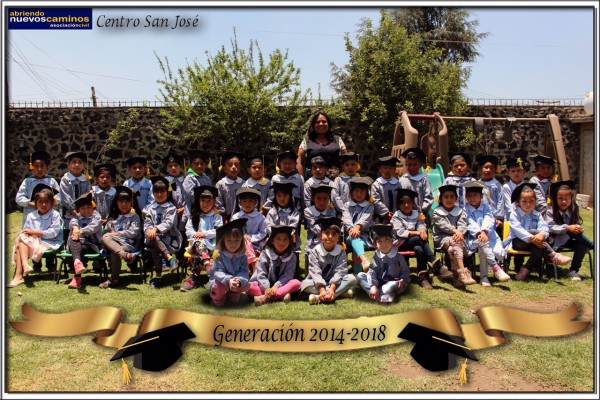
The end of the school year has arrived at Centro San José, marking another year of dedicating ourselves to the comprehensive development of the preschool boys and girls in the Jardines of San Juan Community, Ajusco, Mexico.
The feast that commemorates the end of the academic year is always a moment of joy, and the children attend, elegantly dressed and accompanied by their families. At the same it is a moment of sadness, due to the goodbyes that we must say. For the three-year-old preschoolers, their goodbye is final, and their time of formation with us has ended.
For the teachers of the three-year-old preschoolers, the party marked the conclusion of a long road of accompanying thirty-eight children and their families in their training at Centro San José for three consecutive years. Their next class will be at the primary school, where they will continue their formation.
The feast began with a Mass of Thanksgiving, a beautiful celebration and a good time for the families to show their gratitude for the training and care their children have received at the center. Centro San José also shows their appreciation to the families for the comprehensive work they have done: their involvement, dedication and collaboration with the center in the development of their children throughout the school year.
The work of the parents in the training of their children is important and a big help in their development. The children attend the center daily to play, learn and have fun. Then, it is the continuity at home, where their training in the first stages of life is completed, and they learn values, virtues, skills and knowledge.
We finish this academic cycle with another great achievement: thirty-eight children will attend the primary school to continue their training. The other seventy children will advance to the next levels at Centro San José. At the same time, we will receive a good number of new students and continue to offer this support to the community.
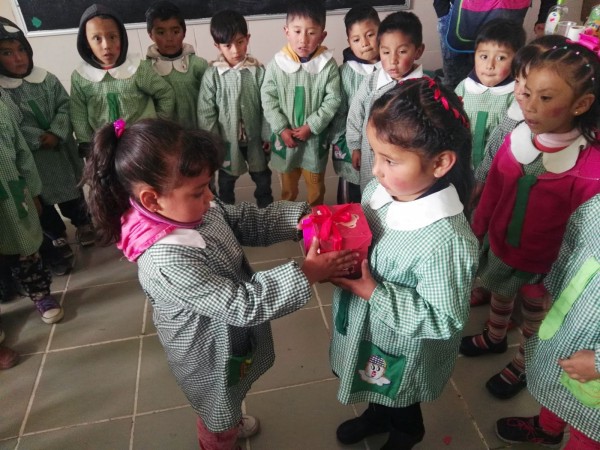
In the month of February, educators at Centro San José of the CSP in Mexico City plan activities for the children to learn about the importance of friendship and to work on the development of social skills.
Presently, the center attends daily to 110 children between the ages of two and six. It is quite common to witness conflicts between children. They fight for a variety of reasons: over a toy, or over any object that they believe is their own, or because a friend doesn’t want to play, or just to be first in line, or because someone made a face or stuck out his tongue or pushed them…
These fights are normal with children of this age group, and many children defend themselves by hitting a classmate or crying out of frustration. Some prefer to go tell the teachers, who tell them over and over again, “Hands are for touching, not hitting”… with irregular success.
On a daily basis, teachers at Centro San José spend much of their time resolving conflicts and misunderstandings. During the month of February, the teachers made an effort to work on the importance of friendship, in order to promote love, respect and affection among the children for their classmates.
On February 14, St. Valentine’s Day, Day of Love and Friendship, educators, together with children, organized an activity so that the children could show their appreciation to their companions at the center. They all brought a little gift to exchange with their classmates. It actually was a very moving activity, filled with thoughtful gestures and hugs.
We want to promote the bonds of friendship among the children at Centro San José, so that they learn, already at their very young age, to respect each other, to apologize when there has been a clash, to treat each other nicely and to value the others as real treasures in their lives.
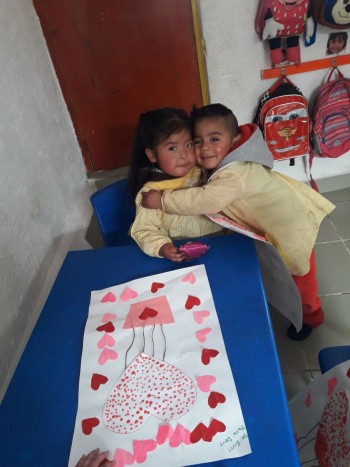
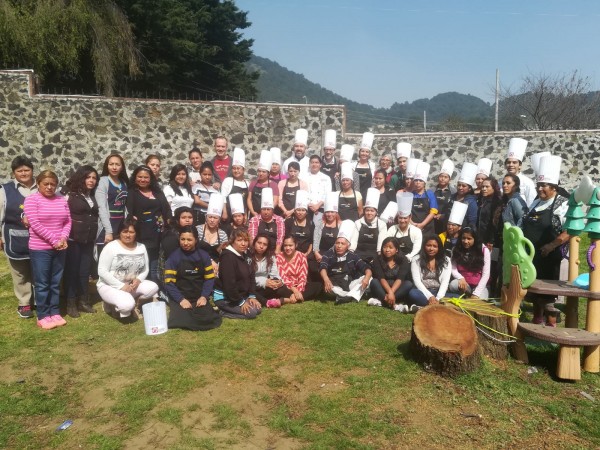
In October and November, the Early Childhood Education Center of Ajusco was the site of two cooking workshops for women. “Tasteful Energy”, the pilot class, is part of the Corporate Responsibility Policy of Fenosa Natural Gas company. Their principal objectives are: strengthening the abilities of young people who are currently studying cooking, and the promotion of space for them in the labor market. This program allows youths, through a certification course, to obtain the tools that will help them begin a career in the world of gastronomy. Cooking classes with women of Ajusco was the trial course in this program, that will now be promoted in other areas of Mexico.
The objective of the workshop is to show how to make simple, affordable, quick and nutritious food for the family. A fundamental aspect of this is the careful preparation and appealing presentation of the dishes. At the end of the course, participants receive a certificate and a gift. The professionalism of the chef and his team contributed to the success of the workshops as well as the equipment they used. Also, the creativity, teamwork, appealing plate presentation, the desire to outdo themselves and the applause of the organizing team were integral in the success of the classes. All of this made the women feel that they were on an episode of the television show “Master Chef”. So, in addition to learning, they spent a few exciting days.
The Community of Saint Paul is thankful for the quality of the workshops and the beautiful and festive atmosphere created by its leaders and participants. We are already thinking about the next workshop; it could possibly be the preparation of dishes like “tacos de canasta”, a simple and affordable dish that could be sold to earn money. Hopefully, it will be soon!
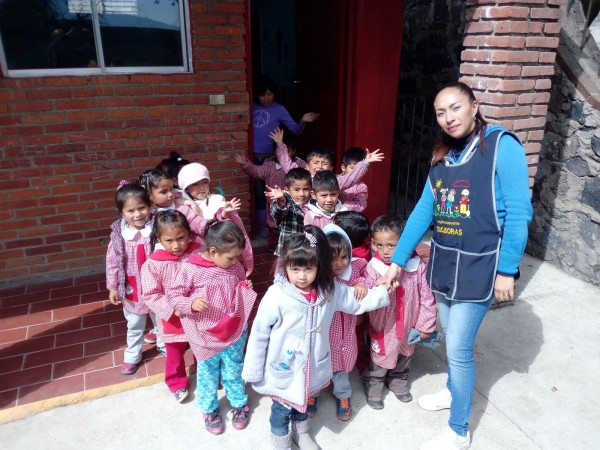
In a society as demanding as ours, it is essential to create a solid educational foundation that promotes the learning and healthy development of children. This is the work that we carry out on a daily basis at the San Jose Community Center for Child Development in Mexico City.
In the 2016-2017 school year, which just ended, 36 boys and girls completed satisfactorily the preschool curriculum. On July 14, to celebrate this achievement, the children were surrounded by friends and family at a happy and grateful “end of the year” party. This is a story with a happy ending, that is repeated each year in the town of Jardines de San Juan.
The work at the center will continue with the remaining 72 boys and girls who will advance to the next level, with almost 40 more who will join the new school year, beginning at the end of August. The spaces are already filled because parents wanted to enroll their children as soon as possible, in order to give them this gift of growth, development and learning.
Since the first day of class (already in the distant past) we engaged in games, activities and learning on a daily basis. The children grew in an environment of healthy coexistence, learning to respect one another, to play together, to share what they have in the center, to accept each other and sometimes to forgive each other, after a fight. This coexistence, adequate nutrition and the tireless work of the educators, all helped to bring about this happy ending for the 2016-2017 school year. We said goodbye to 36 children who completed PreSchool 3, and now are ready to go to elementary school. In a moment as important as this one, the parents and family wanted to be close to their children. In fact, they are proud of the goals they achieved and committed to the road that lies ahead. It was an emotional day, and recognizing how much the children have grown and learned, we, too, share the joy of this happy ending.
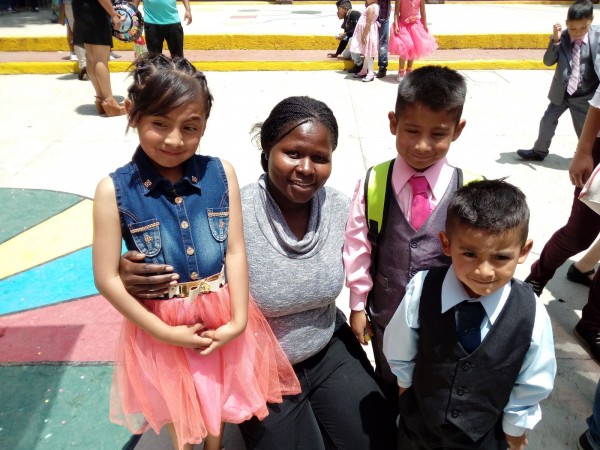
Children from the San José Early Childhood Center in Mexico City visit Pedregal Park and learn about Police work
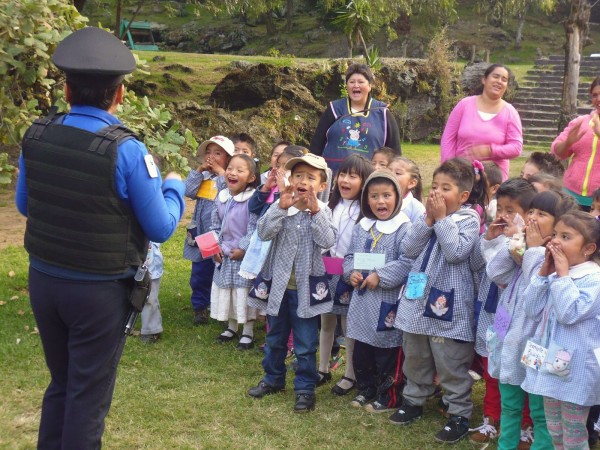
One of the last outings for the children from the San José Early Childhood Center, just a few weeks ago, was to Pedregal Park in Mexico City where they were able to play and enjoy nature. The unique aspect of this outing was that the children were accompanied and protected by three police officers from the area, who played and sang with the children. The little ones couldn’t believe it, because initially they were very afraid of any person in uniform. This is hardly surprising, because parents typically reprimand their children with the statement, “If you behave badly, I will call the police, and they will come look for you and lock you up!” Therefore, it took a while to break down the barriers and for the children to realize that those police officers were good and kind people. The children also learned that police play an important role in society and that they (the children) can go to them if they need help. According to some statistics, Mexico City is one of the 50 most violent cities in the world. The children, the most vulnerable segment of the population, must learn not to fear the police, but to grow as citizens who respect the laws of society. After this singular experience, when asked, “What would you like to be when you grow up?”, now some of the children at the center respond, “A police officer like the ones at Pedregal Park!”
Promotion of Early Childhood Reading at the San José Center in Ajusco, Mexico
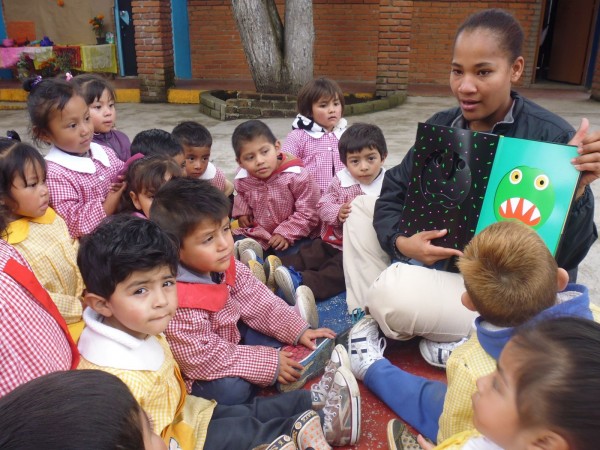
A few months ago, Abriendo Nuevos Caminos Association was selected to participate in the project Libro abierto (An Open Book), organized by IBBY Mexico and Ghandi Bookstore. Abriendo Nuevos Caminos supports the work that the Community of St. Paul is carrying out in the San José Center for Child Development in Ajusco, Mexico City.
The project promotes early childhood reading: it attempts to reach out to children through books, to train facilitators who read aloud, and to create the space in which children can imagine what they are hearing. In order to accomplish these goals, two people from the San José Center completed a 40 hour training course and committed to the task of promoting reading among our children, through the practice of storytelling. The following is the testimony of one of them, Yomaira Cordero:
«For me, to be a reading facilitator has been a new experience. To create a reading space with and for the children is very fulfilling; it’s also something new and different for them, who no longer see reading as a boring activity, but as fun, as a real game.
It is good to provide the tools so that the children become involved in reading, and through it, understand that they can express themselves and discover an attractive new world. They discover that they can express new emotions, they find new ways of getting to know their own environment. And all of this is accomplished always with respect, solidarity and fellowship. A very significant aspect of this project is that parents can have closer communication with their own children, because they go once a week to the classroom to tell stories to the kids.»
From the San José Center we would like to thank the Gandhi Bookstore for the 455 books they donated to us. May the little ones continue to nourish their passion for reading!
A week before classes officially began, the staff and teachers at Centro San José undertook many activities. They relocated classrooms, arranged furniture, painted, retouched doors, cleaned the walls and floors and afterward decorated the preschool grounds. All was done with the purpose of offering a warm welcome to the children of Jardines San Juan (in the outskirts of Mexico City) when they arrived for their first day of class. We began the new school year 2015-2016 at the Centro Comunitario de Desarrollo Infantil San José bursting with happiness. For we know that each day we work on building values to form boys and girls to better the prospects of their future.
Our program focuses on serving young families, especially those newly arrived in the poor, urban district where we have the center. Many of these families have little experience with formal education and the expectations placed on the children and the parents. The center’s goals include basic preschool education, in-school meals and nutrition information for the families and much love and attention to develop, in the children and also their families, the behavioral skills needed for success in school.
The first day of class in the morning, moms and some dads arrived at the main door to leave their children in the hands of their “second moms,” the teachers. The parents then left to travel to their places of work. Some children arrived with the desire to enter and mingle with their friends and classmates. For others it was difficult to return since they had been getting along well at home with their grandma and siblings. Others arrived afraid because it was their first time at school. The littlest ones would not stop crying when they noticed they were being taken from the arms of their moms and received by “strangers.”
As it happens everywhere and at all ages, the adjustment to a new educational surrounding, after the summer, takes a few days. The little ones, especially, had to get used to the environment and relating to classmates who are all attending school for the first time. During the first weeks of this return to classes, the principal work of the teachers is to manage these aspects so that the children become accustomed to each other, relax, live together and get along with ease.
In this new school year, on the first day we already had 106 boys and girls. That is something that greatly satisfied us, since in previous years we had not exceeded 100 children. We are glad to be able to provide nutrition, preschool education and help in the development of the children in this young and growing population, in which our program is enjoying a growing degree of acceptance.







.jpg)







